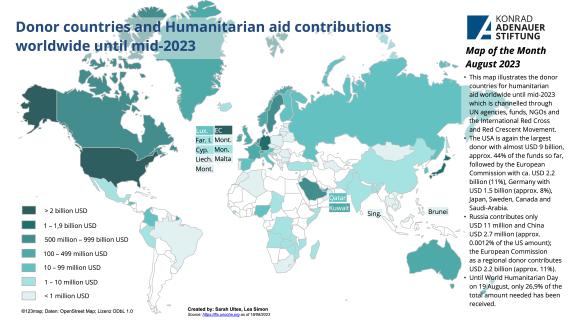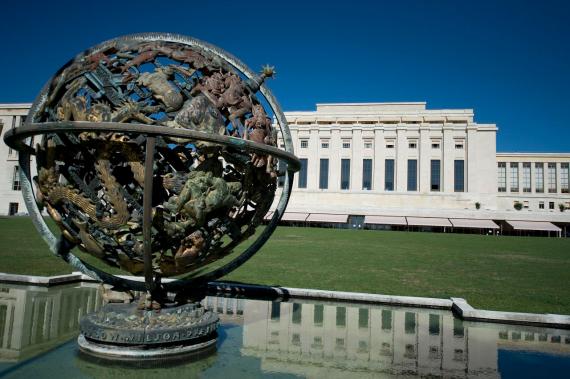#147 THE G|O BRIEFING, AUGUST 24, 2023
Remembering Sergio Vieira de Mello | Will there be an AI arms race? | Quick Takes
This is an online, slightly edited version of our August 24, 2023, Briefing
Friends,
We hope you are well and keeping cool. We are happy to be back reporting from a still sweltering Geneva after a lengthy summer break—and quite excited about embarking on a new adventure as we switch to a fully reader-funded model.
Almost twenty years ago to the day, on the morning of Sunday, August 17, 2003, a young reporter was covering a meeting of the agricultural committee (CoA) at the WTO when his phone rang unexpectedly. On the line from Baghdad, patched through from a satellite phone, was Sergio Vieira de Mello, Kofi Annan’s Special Representative for Iraq.
De Mello wanted to talk. He wanted to do it in his native Portuguese, and to speak to a fellow Brazilian. De Mello was six weeks short of leaving Baghdad, about to return to Geneva to resume his work as UN High Commissioner for Human Rights, at the end of a hellish mission in Iraq. In his interview, he used a vivid image to denounce a war he had been opposed to from the beginning, to drive home the point that the occupation of the country by US and coalition forces would prove disastrous. For the Iraqis, he said, “it’s been traumatic. This must be one of the most humiliating periods in the history of these people. Who would like to see their country occupied? I wouldn’t like to see foreign tanks in Copacabana,” he told the journalist.
Jamil Chade was the reporter. Two days later, on Tuesday, August 19, 2003, Sergio Vieira de Mello, was dead, killed in the terrorist attack (eventually attributed to Al-Qaida) that killed 22 people when a car bomb exploded at the Canal Hotel in Baghdad, the UN’s HQ in Iraq.
Today in The Geneva Observer, Jamil revisits the tragedy of August 19 and how it changed the UN. (Read the full story here)
Also in today’s edition, Daniel Warner escaped the heat for three hours to see Christopher Nolan’s summer blockbuster Oppenheimer. He found the film full of “moral ambiguities,” and it got him pondering our current circumstances. “Following the dangers of nuclear weapon proliferation, shouldn’t we be thinking about unintended consequences in the current technological competition in Artificial Intelligence and Machine Learning? Are there similarities between the Manhattan Project and today’s race between China and the United States in AI and ML?,” he asks. (Read more)
Well, yes, according to a new book. Although he eschews using the terms “arms race,” this very rivalry is the object of Paul Scharre’s Four Battlegrounds: Power in the Age of Artificial Intelligence. A noted defense expert and director of studies at the Center for a New American Security, Scharre writes that “whichever nation leads in AI will have tremendous advantage in setting the terms of the geopolitical order for the twenty-first century. The United States and China are vying for military dominance in the Asia-Pacific region, and AI could help tip the scale to either side.”
“Democracies must work together to lead in AI and present an effective model for AI governance,” Scharre argues in his comprehensive book, as a “race is underway to lead in AI and write the rules of the next century to control the future of global power and security.” It’s a race, he explains, that is already being fought on the four battlegrounds that give his book its title: data, computing power, talent and institutions. In Scharre’s view, the fourth of these battlefields may prove to be the most critical—and give an edge to the West—as he argues that the most powerful global AI power will be the one that manages to successfully integrate AI into their economy, society, and military.
Quick Takes
BRICS-à-brac!
The BRICS are expanding. The group's Johannesburg summit ended today with an agreement between the original members to enlarge. Brazil, Russia, India, China, South Africa have welcomed Argentina, Egypt, Ethiopia, Iran, Saudi Arabia, and the United Arab Emirates into the organization.
The rest of the world, though, is left wondering about the purpose of "BRICS 2.0" aside from putting together a group of countries whose common denominator seems to be resentment about Western leadership. We'll come back to it next week.
In the meantime, we're curious to find out what their new acronym will be.
Musical chairs
The ILO has a new deputy director-general, Celeste Drake. Reuters revealed in early August that Joe Biden’s top labor adviser left her role at the White House at a time when the Biden administration is attempting "to maintain labor peace and avoid threatened strikes during an election year.” Her arrival here increases the number of Americans in senior UN management positions. Welcome to Geneva!
Even in a heatwave, a barometer and a map remain useful
Our friends at KAS-Multilateral Dialogue have published their August Map of the Month marking World Humanitarian Day on August 19. It reveals that only 26.9% of required humanitarian funds for 2023 have been received by UN agencies, NGOs, and organizations such as the Red Cross and Red Crescent Movement.

And their latest Geneva Barometer, covering the period from April to July, is here. It covers—among other topics—the World Health Assembly (WHA), the negotiations on the pandemic agreement, the International Labour Conference, and an analysis of the most important developments from the 53rd session of the UN Human Rights Council. ITU’s ‘AI for Good’ Summit is also covered.

Do you fancy another summit?
High-level summitry is increasingly prominent in international diplomacy, writes Richard Gowan, UN Director at the International Crisis Group. From the United Nations General Assembly (UNGA) to the G20 or the just-concluded BRICS summit, these gatherings, Gowan writes, reflect two realities of modern diplomacy: “One is that national leaders increasingly shape foreign policy, sidelining foreign ministers and ministries. The second is that, in an interconnected era, there is little to stop these leaders engaging one another directly.”
-PM
That’s the G|O Briefing for this week. Thank you for reading and supporting us. We hope you will subscribe.
Today's Briefing: Philippe Mottaz - Jamil Chade - Daniel Warner
Editorial assistance: David Jenny
Edited by: Dan Wheeler



